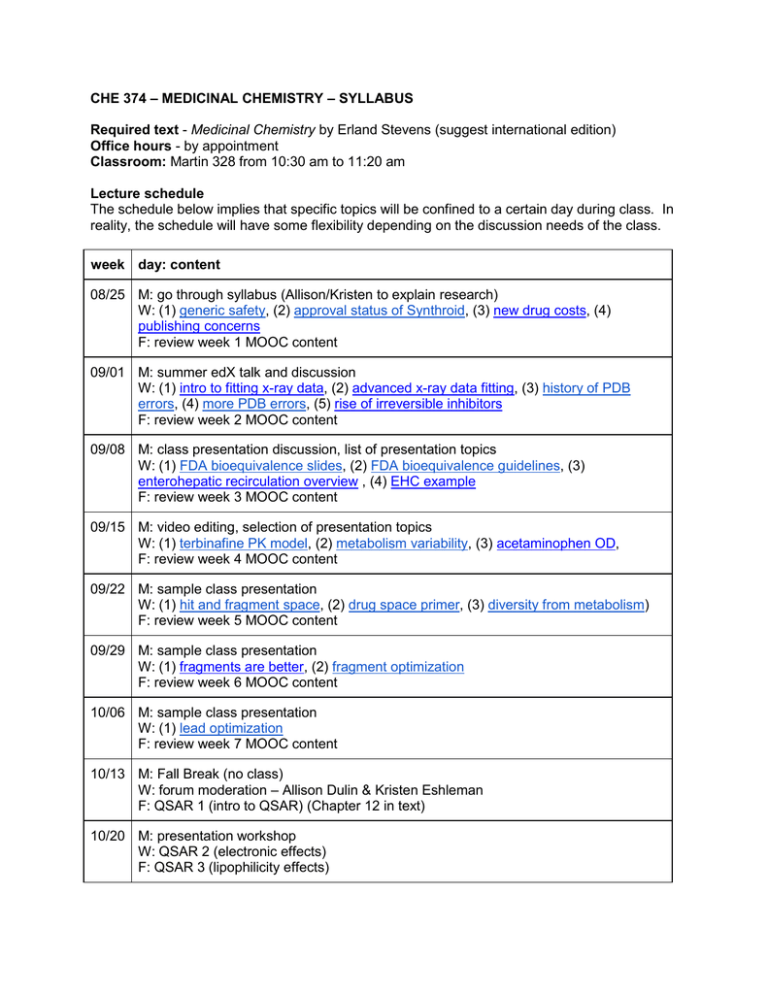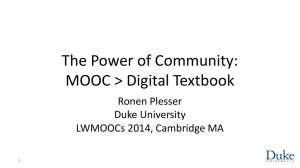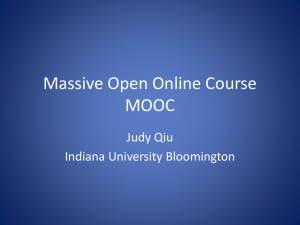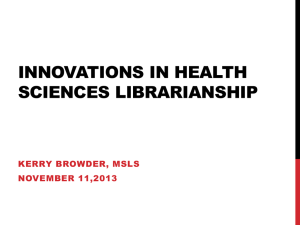CHE 374 – MEDICINAL CHEMISTRY
advertisement

CHE 374 – MEDICINAL CHEMISTRY – SYLLABUS Required text - Medicinal Chemistry by Erland Stevens (suggest international edition) Office hours - by appointment Classroom: Martin 328 from 10:30 am to 11:20 am Lecture schedule The schedule below implies that specific topics will be confined to a certain day during class. In reality, the schedule will have some flexibility depending on the discussion needs of the class. week day: content 08/25 M: go through syllabus (Allison/Kristen to explain research) W: (1) generic safety, (2) approval status of Synthroid, (3) new drug costs, (4) publishing concerns F: review week 1 MOOC content 09/01 M: summer edX talk and discussion W: (1) intro to fitting x-ray data, (2) advanced x-ray data fitting, (3) history of PDB errors, (4) more PDB errors, (5) rise of irreversible inhibitors F: review week 2 MOOC content 09/08 M: class presentation discussion, list of presentation topics W: (1) FDA bioequivalence slides, (2) FDA bioequivalence guidelines, (3) enterohepatic recirculation overview , (4) EHC example F: review week 3 MOOC content 09/15 M: video editing, selection of presentation topics W: (1) terbinafine PK model, (2) metabolism variability, (3) acetaminophen OD, F: review week 4 MOOC content 09/22 M: sample class presentation W: (1) hit and fragment space, (2) drug space primer, (3) diversity from metabolism) F: review week 5 MOOC content 09/29 M: sample class presentation W: (1) fragments are better, (2) fragment optimization F: review week 6 MOOC content 10/06 M: sample class presentation W: (1) lead optimization F: review week 7 MOOC content 10/13 M: Fall Break (no class) W: forum moderation – Allison Dulin & Kristen Eshleman F: QSAR 1 (intro to QSAR) (Chapter 12 in text) 10/20 M: presentation workshop W: QSAR 2 (electronic effects) F: QSAR 3 (lipophilicity effects) 10/27 M: presentation workshop W: QSAR 4 (steric effects) F: QSAR 5 (examples) 11/03 M: QSAR 6 (examples) W: QSAR 7 (other QSAR tools) F: QSAR 8 (CoMFA) 11/10 M: QSAR questions W: drug synthesis 1 (Chapter 13 in text) F: QSAR exam 11/17 M: class presentations W: class presentations F: class presentations 11/24 M: drug synthesis 2 W: Thanksgiving Break (no class) F: Thanksgiving Break (no class) 12/01 M: drug synthesis 3 W: drug synthesis 4 F: course evaluations 12/08 M: drug synthesis 5 W: drug synthesis homework due Gradebook weighting edX grade Class presentation Class discussion Forum moderation Homework In-class test 25% 25 10 10 10 20 Description of gradebook factors edX grade Students will complete the exercises in the edX content. Parts of the edX content include the inclass exercises and examinations. Students may work on the in-class exercises together, but the examinations must be completed without assistance. Class presentation Toward the end of class, groups of three students will present an overview of a marketed drug. The presentations will be 20-minutes long and pre-recorded. Topics for the presentations may include the following: imatinib (kinase inhibitor), quinolone antibiotics, loratadine (antihistamine), duloxetine (SSRI) (see also this page and included links), omeprazole (antiulcer – ask for article pdf), alprazolam (benzodiazepines – anxiety), atorvastatin (cholesterol), quinapril (hypertension), amlodipine (dihydropyridines – hypertension – see Fleckenstein Circ. Res. 1983, 52, 3-16), and sulfonylureas (diabetes – see also this article for some controversy). Class discussion This course relies upon extensive class discussion on different topics in medicinal chemistry and management of the MOOC. Involvement in these discussions is vital for the success of the course. Interactions will be valued based on quality, not quantity. Forum moderation Students will help moderate the edX course in weekly sessions. Homework One homework set on the Chapter 13 of the textbook will be collected. In-class exam The single exam will cover the online material as well as Chapter 12 of the textbook. Consent to participate in Davidson College research study The college is seeking to understand how online learning might enhance or support residential courses and the liberal arts broadly. This course was one of four courses selected for Davidson’s edX Ed Tech initiative out of the President’s Office. The course is a hybrid model, meaning it will include an online component with other learners from around the world. The goal of this study is to gain a deeper understanding of the residential learner experience in this hybrid course, as well as the potential for online learning components, only from the perspective of Davidson College students. Students under 18 will not participate in the study. The research consists of in-class observations, surveys, interviews, and focus groups. Face-toface sessions will be recorded, solely for the purpose of accurate transcriptions. Recordings will only be accessible by the researchers, and will be deleted upon transcription. Student names will not be disclosed in any reports concerning this research without their consent, or disclosed to anybody else unless compelled by law. Participation in this research is voluntary. You may agree to an interview or you may decline an interview. If you agree to an interview, you may refuse to answer any question and you may end the interview at any time. If you have any questions about this study, you may contact your professor. If you have any questions about your rights as a participant, you may call the Chair or Vice Chair of the Davidson College IRB, Dr. Meghan Griffith, (704) 894-2403, or Ms. Sharon Byrd (704) 8942158. Release of rights to class presentation One goal of this course is for groups of students to create presentations that will be used in the edX medicinal chemistry MOOC. In order for Davidson College to include these presentations in the MOOC, students must release their rights to the new content exclusively with regard to the use of the content in the MOOC. Release is completely voluntary. Detailed schedule of blended portion of course Week 1 of MOOC Released on Monday, August 25th at 12:00 EST Grading deadline on Monday, September 1st at 12:00 EST Week 2 of MOOC Released on Friday, August 29th at 12:00 EST Grading deadline on Monday, September 8th at 12:00 EST Week 3 of MOOC Released on Friday, September 5th at 12:00 EST Grading deadline on Monday, September 15th at 12:00 EST Week 4 of MOOC Released on Friday, September 12th at 12:00 EST Grading deadline on Monday, September 22nd at 12:00 EST Week 5 of MOOC Released on Friday, September 19th at 12:00 EST Grading deadline on Monday, September 29th at 12:00 EST Week 6 of MOOC Released on Friday, September 26th at 12:00 EST Grading deadline on Monday, October 6th at 12:00 EST Week 7 of MOOC Released on Friday, October 3rd at 12:00 EST Grading deadline on Monday October 13th at 12:00 EST


